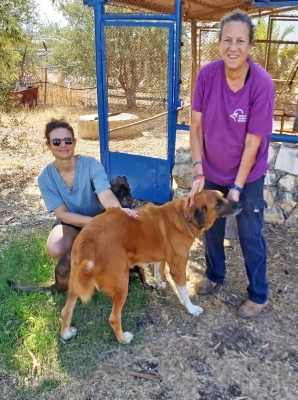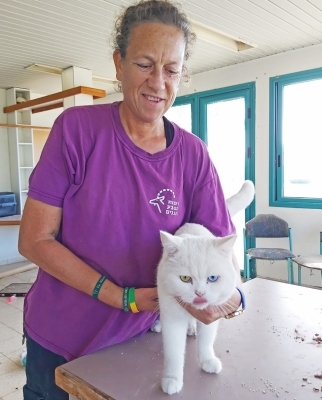Animals Rescued, Two by Two and More
Ein Harod (Meuchad) Petting Corner
Text and Photos by Lydia Aisenberg
Established many years ago, the petting zoo of Kibbutz Ein Harod (Meuchad) became run down after the formerly socialist-based kibbutz was privatized a decade or so ago. A system of internal taxation was developed with individual members having to pay into a communal kitty in order to cover the general upkeep of the 102-year-old kibbutz grounds, dining room and other facilities … and of course, also the in-house small zoo.
However, some months ago a renovation project slowly began to take shape and little by little, under the loving care of Tsukit Raviv, a member of nearby Kibbutz Heftzibah, the Ein Harod petting zoo began to get back on its feet – whether they be attached to two or four legs – and in the case of the snakes, no legs at all!
Nowadays, due to the Israel-Gaza war, the animal enclosures and small buildings that belong to the complex, which is still under renovation, have become a mini-rescue center for a wide range of animals, big and small, which were left behind when their owners hurriedly left their homes and farms during the mass evacuation of survivors of the barbaric attacks on the Israel-Gaza border's mostly agricultural communities.
"A large number of evacuees were taken to hotels in Eilat and the Dead Sea and other parts of the country and most of the hotels have a no-pet policy, so even if people had managed to scoop up their pets and take them with, they couldn't keep them in their temporary hotel accommodation," explained Tsukit to the Jewish Telegraph.
"There are many animal rescue and care organizations in Israel and very quickly they began to work together to save as many of the not-by-choice abandoned pets and bring them to safety, to try and trace their owners and wherever possible, reunite them. If they were not able to have their pets with them wherever they had been placed as evacuees, then through the combined efforts of the various organizations temporary homes were found or, as in the case of our petting zoo here in Ein Harod, asked to take them under our care until they can once more be able to rejoin their families – and who knows when that will be," she says with a deep, sad sigh.
Many of the traumatized household pets, often found wandering in a daze amongst the rubble of burned out houses or hiding in undergrowth, had been rescued by IDF soldiers and Israeli volunteers. Photographs of hundreds of animals have been posted on social media sites in attempts to reunite them with their owners who, tragically in many cases, had been murdered or taken hostage by Hamas terrorists or those Palestinians who followed in their wake in order to pillage.
Since thousands of Israelis living in the northern part of the country, in Kiryat Shmona and in northern border kibbutzim and moshavim, were also evacuated, again to hotels or staying with friends or relatives in more central parts of the country, the animal rescue and care organizations have been inundated with pleas for help – including from northern kibbutzim where they had established petting zoos of their own.
"So far we have taken in a large number of animals on top of our own. The newcomers include dogs, cats, pet mice, donkeys, sheep, goats, snakes, rabbits, guinea pigs and more. Actually right now I am waiting for five goats from one of the northern moshavim, Shaar Yishuv, as the families have also been evacuated and one family couldn't take their five pet goats with them," explained Tsukit, who is also a volunteer with the animal rescue organization, Chaibalance (a play on the Hebrew word Chai – live – and ambulance).
One of the dogs under Tsukit's loving care belongs to a man from a nearby town who lived by himself, received an emergency call from the army and left immediately – thinking he would be home within a few days. Unfortunately, that did not happen and Tsukit received a call to go to his home and rescue the dog, which she did. "The poor animal was in a terrible state, had not eaten, was shaking and terrified. But little by little, since being here in Ein Harod, he is now beginning to eat again, be less nervous and with the vet administering trauma treatment, he will be okay when hopefully the soldier returns.
"We are getting very overcrowded, but on the other hand we are helping so many animals and by taking good care of them, embracing their owners who, we hope, will eventually be able to return to their homes and reclaim their pets," said Tsukit.
Wherever possible, Tsukit is seeking financial help to pay for feed and medical treatment for the newcomers. "Most people have no idea of how expensive feed is for some of the animals now under our care."
Kibbutz Ein Harod (Meuchad) is situated in the narrow eastern portion of the Jezreel Valley, nestling in the shadow of the Mt. Gilboa range of mountains and a very short distance from the Jordan Rift Valley. It is one of three kibbutzim that, as they have developed over the years, literally run one into the other these days: Ein Harod (Ichud), Ein Harod (Meuchad) and Tel Yosef.
All three kibbutzim have taken in evacuees from the south and also from the northern communities. Among the evacuees are many children who are now visiting the Ein Harod (Meuchad) zoo where they are able to help Tsukit tend the needs of the animals. And the kibbutz children are making new friends with their temporary guests – through their common love of and caring for animals.










Comments